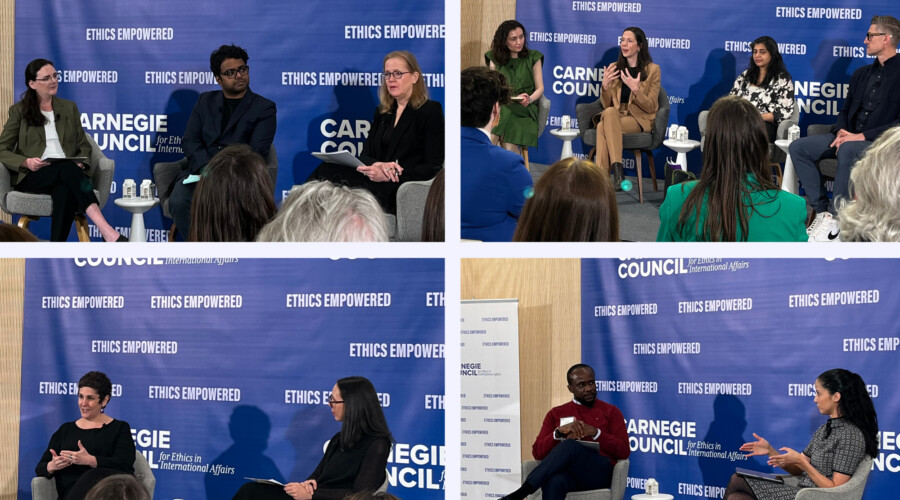On July 13 the Museum of Jewish Heritage, in collaboration with the Academy of Bosnia and Herzegovina (ABH), will host a public panel discussion, "Genocide and Aftermath: Rationalizing the Process of Truth and Reconciliation in Bosnia and Herzegovina" (go to attendance details). The Carnegie Council on Ethics and International Affairs has played an advisory role in setting up the panel and in suggesting several themes for discussion. (go to panelist list.)
Srebrenica, the world's first United Nations Safe Area, was the site of the worst case of genocide in Europe since the Holocaust. In July 1995, after staging a brutal military takeover, Bosnian Serb soldiers, as well as military units under the control of the Serbian government, systematically murdered more than 7,800 men and boys. In the landmark ruling Prosecutor v. Krstic, the Appeals Chamber of the International Criminal Tribunal for the former Yugoslavia unanimously ruled that this was an act of genocide.
"Held on the tenth anniversary of the Srebrenica genocide, this event will raise awareness of the tragic suffering of the Bosnian people," said Haris Hromic, project director at ABH. He explained that the aim is to assess future actions necessary to provide a workable program that will allow Bosnia and Herzegovina and the international community to pursue a sustainable and realistic reconciliation process over the next five years.
Added Carnegie Council President Joel Rosenthal: "On the tenth anniversary of Srebrenica, we pause first and foremost to remember the victims. We remember that ethnic cleansing in Europe happened not only in the early and middle periods of the twentieth century, but also at century's end. As we reflect, we also look forward, asking ourselves what can be done to end cycles of violence and promote peaceful coexistence."
* * * * *
Where: Safra Hall, Museum of Jewish Heritage, 36 Battery Place, Battery Park City, New York, NY 10280
When: Wednesday July 13, 2005, 6:30 PM to 8:30 PM
RSVP: Free with suggested donation. Reserve by phone at 646/437-4202; online or in person (visit the museum's box office at 36 Battery Place, Battery Park City, NYC).
* * * * *
Keynote Speaker: Charles Ingrao, professor of history at Purdue University and director of the Scholars' Initiative concerning the divisions among the peoples of the former Yugoslavia.
Moderator: Roy Gutman, Newsday foreign editor and winner of the Pulitzer Prize for international reporting for his reports on "ethnic cleansing" in Bosnia-Herzegovina.
Panelists:
- H.R.H. Prince Zeid Ra'ad Zeid Al-Hussein, ambassador and Permanent Representative of the Hashemite Kingdom of Jordan to the United Nations.
- Elazar Barkan, professor of history and cultural studies at Claremont Graduate University in Los Angeles, California, and the director of the Institute for Historical Justice and Reconciliation.
- Donald S. Hays, currently with the U.S. Institute for Peace; served until recently as the Principle Deputy High Representative in Bosnia Herzegovina with the rank of ambassador.
- Mirza Kusljugic, Ambassador Extraordinary and Plenipotentiary and Permanent Representative of Bosnia and Herzegovina to the United Nations; formerly served as an elected member of the parliament of Bosnia and Herzegovina, House of Representatives (1998-2001).
* * * * *
The Carnegie Council on Ethics and International Affairs is a premier forum on ethics and international policy. Through our programs, our publications, and our Web site, we offer expert guidance on the great moral issues of war, peace, and social justice.

